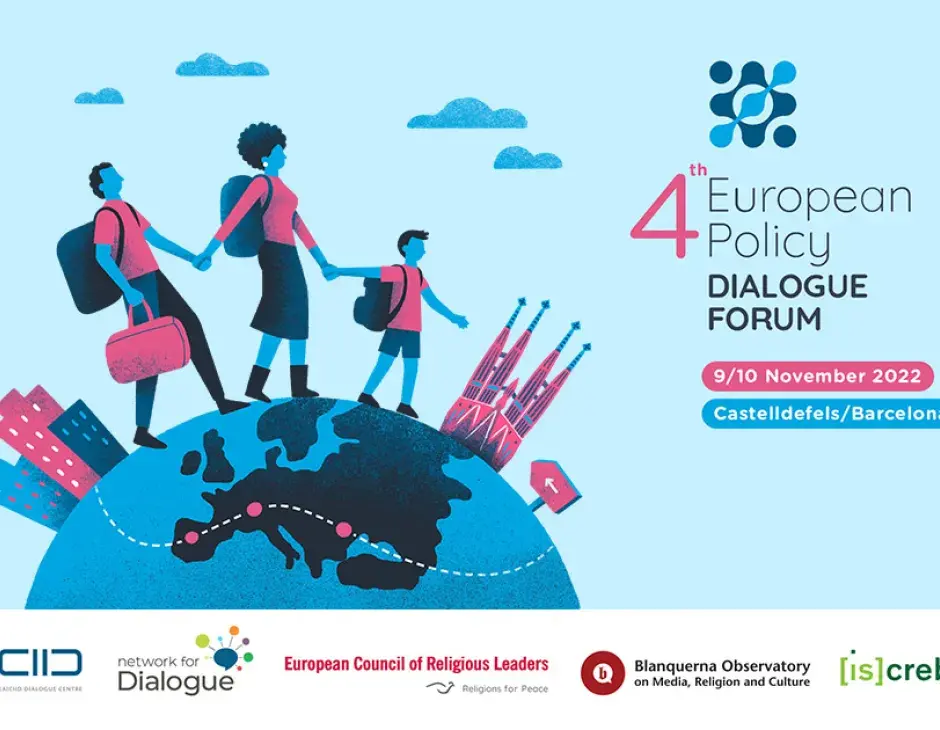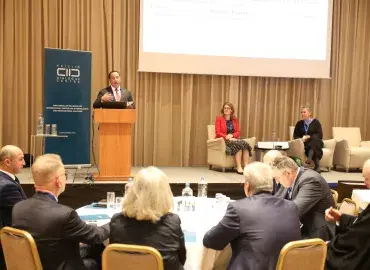Conference in Barcelona to Address Social Inclusion And Role of Media in Countering Hate Speech in European Cities
International Dialogue Centre (KAICIID), Blanquerna Observatory for Media, Culture and Religion and partners to co-host the conference “European Policy Dialogue Forum” on 9/10 November in Castelldefels / Barcelona. Portuguese High Commissioner for Migration and OSCE´s Head of Tolerance and Non-Discrimination among speakers.
Castelldefels/Barcelona, 7 November 2022 - Under the theme “Social Inclusion in Cities - Strengthening Multi-Stakeholder Partnerships to Bring Communities into Dialogue”, the International Dialogue Centre (KAICIID), the Blanquerna Observatory for Media, Culture and Religion, the European Council for Religious Leaders (ECRL/RfP Europe), the Higher Institute for Religious Sciences of Barcelona (ISCREB) and the KAICIID-supported “Network for Dialogue” will jointly host the “4th European Policy Dialogue Forum” in Castelldefels / Barcelona. The forum is supported by the OSCE Office for Democratic Institutions and Human Rights (ODIHR).
Once every year, this unique event serves as a platform for civil society actors, policymakers, representatives of faith-based organizations and academic experts who come together to discuss the most pressing issues related to the inclusion of refugees and migrants across Europe. The 4th edition of the forum will be attended by more than 100 participants from over 30 different countries.
Thematically, this year’s gathering will explore the role of the media in countering hate speech as well as the importance of forging multi-stakeholder partnerships to support the social inclusion of migrants and refugees in European cities. Participants will jointly discuss the roles of different stakeholders – from journalists to policymakers and religious communities – and the importance of them working together towards more inclusive societies for all.
“Governments and multilateral actors cannot alone galvanize the commitment to foster social inclusion across European cities. To tackle this huge task, we also need broad collaboration with and between the religious communities, civil society representatives and grassroots activists. Through the European Policy Dialogue Forum, we seek to increase engagement between all these stakeholders, make their voices heard, share all the different perspectives and discuss ways to cooperate more effectively”, KAICIID’s Secretary-General, Zuhair Alharthi, said about the event.
“The high number of people arriving on the European continent fleeing situations of poverty, war, violence or lack of security makes integration a crucial issue. The European Policy Dialogue Forum is a key space in this regard, as it brings together actors from different fields with the common goal of migrants integration. This year's edition, focused on the role of the media, is highly appropriate as migrants' contact with the world's citizens takes place mainly through these spaces and is the journalists responsibility to present and describe these groups beyond labels”, Miriam Díez-Bosch, from Blanquerna Observatory stated.
Among the speakers and panellists at this year’s 4th Policy Dialogue Forum are:
- Sónia Pereira, High Commissioner for Migration of the Republic of Portugal
- Kishan Manocha, Head of Tolerance and Non-Discrimination, Organization for Security and Cooperation in Europe (OSCE)
- Míriam Díez Bosch, Director of the Blanquerna Observatory on Media, Culture and Religion, University Ramon Llull
- Rev. Dr. Thomas Wipf, President of the European Council for Religious Leaders Religions for Peace Europe
- Metropolitan Emmanuel, Metropolitan Elder of Chalcedon and member of KAICIID´s Board of Directors
- Milica Pešić, Executive Director, Media Diversity Institute
- Lakshmi Vyas, President of the Hindu Forum Europe
- Thomas Andersson, Chair of the Current Affairs Committee to the Congress of Local and Regional Authorities of the Council of Europe
About KAICIID
The International Dialogue Centre (KAICIID) is an intergovernmental organization that promotes dialogue to build peace in conflict areas. It does this by enhancing understanding and cooperation between people of different cultures and followers of different religions. Its Board of Directors comprises prominent representatives from five major world religions (Buddhism, Christianity, Hinduism, Islam, and Judaism). KAICIID’s vision is a world where there is respect, understanding, and cooperation among people, justice, peace and reconciliation, and an end to the abuse of religion to justify oppression, violence, and conflict.
About the Blanquerna Observatory on Media, Culture and Religion
The Blanquerna Observatory on Media, Religion and Culture is an interdisciplinary space for research and dissemination of information and activities on communication and religion. The Observatory follows trends in religious information, the presence of religion in the media, communication and new technologies, and the latest news on the right to freedom of religion and belief. It also researches the links between popular culture and the spiritual aspects of society. All this, prioritising research, training, dissemination, publication and internationalisation of the religious phenomenon. It participates in activities that link the religious side with social cohesion, freedom of expression and the naturalisation of the religious fact in increasingly complex societies.
About the Network for Dialogue
The Network for Dialogue is a European-wide platform established to bring faith and civil society actors together to promote the use of dialogue and develop more effective recommendations for social inclusion policies for migrants and refugees in Europe. Established with the support of KAICIID, the Network currently has 25 members from 15 different countries.
Register to join the event
The media is cordially invited to join the event. To register, to submit an interview request or to receive further information about the event, please contact robert.gartner@kaiciid.org.
Participants at the 1st European Policy Forum on Refugees and Migrants called for faith-based and secular institutions to…
On 2 April 2019, the KAICIID Dialogue Knowledge Hub hosted a…




